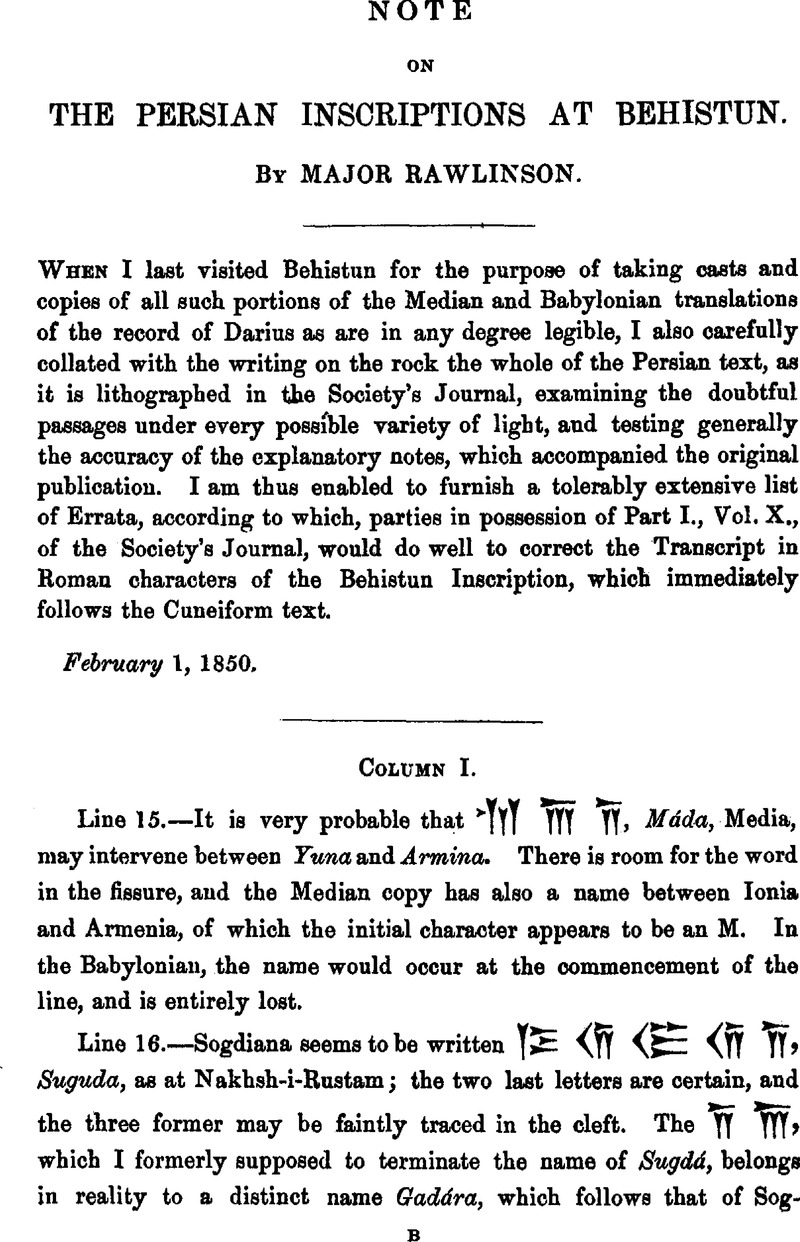No CrossRef data available.
Article contents
Note on the Persian Inscriptions at Behistun
Published online by Cambridge University Press: 14 March 2011
Abstract

- Type
- Notes
- Information
- Copyright
- Copyright © The Royal Asiatic Society 1849
References
page XII note 1 Herod, lib. iii. c. 70.
page XII note 2 Lib. iii. c. 118, 119.
page XIII note 1 Herod, lib. iii. c. 68 to 70.
page XIII note 2 Lib. vii. c. 62.
page XIII note 3 Lib. iii. c. 68.
page XIII note 4 Lib. iii. c. 141
page XIII note 5 There is also an Otanes, married to a daughter of Darius, who commanded in the war against Ionia and ÆoYia, in B.C. 497, and took Clazomenæ and Cyme; but this is neither the conspirator, nor the leader of the Persian contingent.
page XIII note 6 Herod, lib. vii. c. 61.
page XIV note 1 Phot. Bib. p. 1158.Google Scholar
page XIV note 2 Herod, lib. vii. c. 82.
page XIV note 3 Herod, lib. ix. c. 62, 63.
page XIV note 4 Lib. vii. c. 2.
page XV note 1 Herod, lib. vii. c. 6.
page XV note 2 Lib. vi. c. 43.
page XV note 3 Lib. iv. c. 132, 134.
page XV note 4 Ctesias, whose great object it was to differ with Herodotus, named the fellow conspirator of Darius, ![]() instead of
instead of ![]() , confounding the father and son, as in the case of Otanes and Anaphes. In speaking also of the favour which Mardonius enjoyed at the Court of Xerxes before the Grecian expedition was set on foot, he calls him
, confounding the father and son, as in the case of Otanes and Anaphes. In speaking also of the favour which Mardonius enjoyed at the Court of Xerxes before the Grecian expedition was set on foot, he calls him ![]() , as if he really supposed him to be the same noble who helped to slay the Magian thirty-six years previously.
, as if he really supposed him to be the same noble who helped to slay the Magian thirty-six years previously.
page XV note 5 Herod, lib. vii. c. 35.
page XV note 6 Ib. c. 83.
page XV note 7 Ib. c. 65.
page XV note 8 Strabo, , Oxf. Edit. p. 771Google Scholar. The last king of the line was Orontes, who was dispossessed by Artaxius and Zadriadris.
page XVI note 1 Herod, lib. iii. c. 154 to 160.
page XVII note 1 For notices of Megabyzus and Zopyrus, see Herod, lib. vii. c. 82, and lib. iii. c 160, and Ctesias, passim. The ![]() left in command in Europe after Darius had returned from Scythia, was a different person altogether.
left in command in Europe after Darius had returned from Scythia, was a different person altogether.
page XIX note 1 Oxford Edit. p. 1031.Google Scholar


